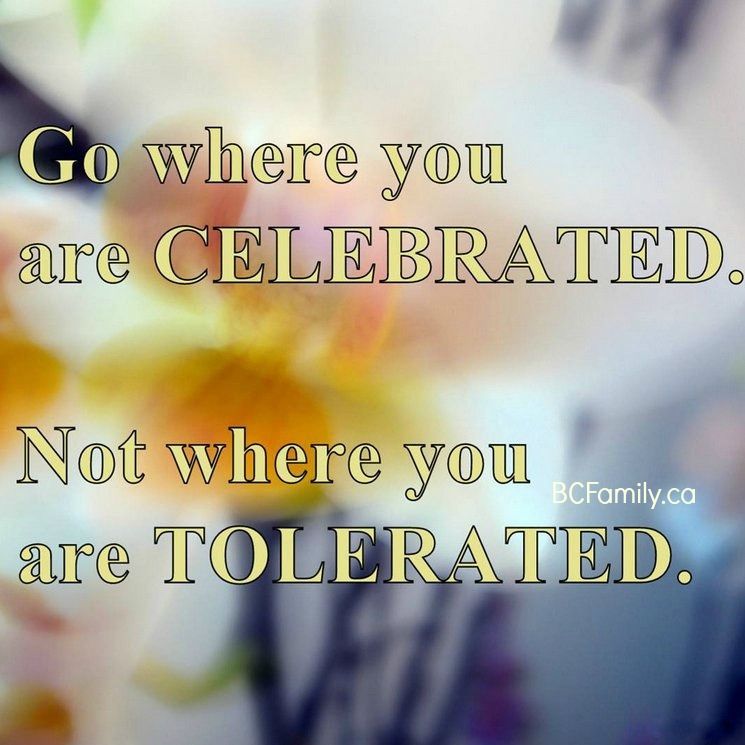Pamela Chan, BCFamily.ca/ Editorial
In the spirit of Eleanor Roosevelt’s advice, no one can make you feel bad about yourself without your consent.
This is a good strategy but it’s not always easy to follow – especially when you’re putting yourself out there with your creative output and feeling vulnerable.
I’ve been actively involved in creative projects in a keen way for most of my life. Here’s what I’ve observed about coping with critics and fear of failure.
- If your artistic efforts makes you feel joyful and satisfied, you’re on the right path. Other people’s assessments don’t matter if you’re benefiting from the time you spend facing creative challenges.
- If someone doesn’t like you or – more likely – feels competitive towards you, they’re not going to care too much about what you’re doing. So the next time you get shade thrown your way, consider the source.
- Some people have foot in mouth disease. They will say pretty awful comments to you directly without filtering their opinions. And these comments are not necessarily accurate or warranted. Surround yourself with positive people who have your back. Be open to receiving constructive criticism but from the right quality of source.
- Teachers do not focus on all of their students equally. If you “click” with your teacher, that person will go the distance for you and support your development. If your teacher either doesn’t notice you, is more focussed on other people or has an impression of you that doesn’t work in your favour (I’ve experienced this), your art will not reach its full potential. You might start to feel downhearted about your efforts and self critical. There are many different types of education opportunities out there from evening and day classes to special themed trips and longer term residency programmes. Choose your teachers carefully.
- Don’t ignore the worries you have about criticism in your head. Life coach Marie Forleo suggests that we should make a note of these potential criticisms (or actual ones we’ve encountered) and write them down. Be clear with yourself about why you are doing what you are doing. Most likely you’re not creating a product to meet the approval of millions of Apple product users. If even a few people appreciate your work, you’ve created a positive experience for them as they interacted with your art.
- Don’t hold yourself back because you’re afraid of criticism or being rejected. There are many ways that you can put your creative output out there in a way that feels comfortable for you. You can join an art club (think painting, writing etc). You can submit your work to be included in a local art show. Your local newspaper is always a good resource for news about opportunities. (Yay local newspapers!) Try to read a hard copy. It’s easy to miss information when you’re skimming through a website. Always keep your eye on local bulletin boards and watch out for flyers at the local library. You can share your artwork on e-commorce sites used by artists such as Red Bubble (here’s my page) or Etsy. You can start your own website. (If you are an artist, be careful about how you upload photos of your work. Watermarks and disabling downloading are a good idea.) Unless you’re a famous person who values privacy, what is the benefit of keeping your work all to yourself? When you step out into the light, you gain valuable feedback and even tips from other artists.
- There will always be people who have pursued their talents longer than you have or, perhaps, appear to be more talented. But there are just as many people who have never tried what you’ve been doing, or could barely keep up with you now. Don’t diminish what you’re doing by comparing your efforts to those of people who’ve been kicking the can longer. Keep your head down and keep going. Day by day, your skills will improve.
- Cream and other substances are rising to the top. Using social media tools, savvy self promoters can get the word out about what they’re doing. If you’re creating substantial pieces of work but you’re not getting your name out there, people won’t find you. A half-way there effort to promote yourself could lead to disappointing results. Don’t take a limp response from others as a form of criticism. It may be that you need to self-promote or in a different way – and not repeatedly in the same place.
- Don’t confuse silence with criticism. If you tell your friends, colleagues and family members about your work and ask for support, don’t be surprised if less than 10% engage with you in some way. Easy ways to engage would include speaking with you directly; sending you a message or E-mail; liking your Facebook page or update; sharing your information with others; or, leaving a comment online. There are many reasons why even the people who know you don’t respond to your efforts to create awareness about what you’re doing. Often the reasons aren’t about you. And if their understanding is misplaced – for example they think you don’t need their support or they confuse promotion with bragging – you’re not going to change their perspective. I have a small core group of friends who support me from afar unfailingly. Appreciate the support of that 10% for the gift that it is and remember to extend the same courtesy their way. When someone you know says “I just did this or that”, it might be one of the few times that they actually speak about their own accomplishments. We assume, too readily these days, that people are showcasing and bragging. When it comes to support, reciprocity is always welcome and a good idea.
- Be inspired by other people’s achievements and think about taking action. When you see someone else making an effort or taking a risk, ask yourself how you could do the same. How can you carve out time or opportunity in your life to take on your creative pursuits?
- Take note of famous peoples’ struggles. I appreciated reading about an author of a now famous novel that was made into an Oscar award wining movie. It seems that her novel was turned down by agents 60 plus times. It got to the point where she didn’t even think that her husband believed in her. She persevered without announcing to others what she was doing. It’s heartening to know that a rocky start and even slim-on-the-ground support isn’t uncommon.
- Join online chat groups and social media groups where you can seek support and exchange ideas and tips. You’ll often find that others are facing the same challenges.
- It’s OK to work in private at first but please do not embrace the notion that only success should speak for what you do – and that you shouldn’t toot your own horn. BLOW YOUR OWN HORN. Goodness knows other people with less to report are grabbing the microphone regularly and with confidence. Let people know what you’re doing when they ask “what’s new with you?”. Share contact information about your online websites or group page. Establish a connection on LinkedIn. And take advantage of community opportunities (like some of the ones mentioned previously) to gain exposure.
I spend a lot of time supporting friends in whatever way I can. And I really appreciate friends who do the same for me. Reciprocity matters
— BC Family (@bcfamilyca) May 18, 2016
I’ve been involved in creative output my whole life. (You can catch a glimpse of part of my artist’s resume here.) I mostly focus on fine art and photography. As one of my children (age 6 1/2) reminded me just yesterday, as an artist you have to have faith in yourself and your skills.
How do you stop fear of criticism from affecting your creative output? You can comment about this posting on the BCFamily.ca Facebook page. Your contribution matters so don’t be shy!


